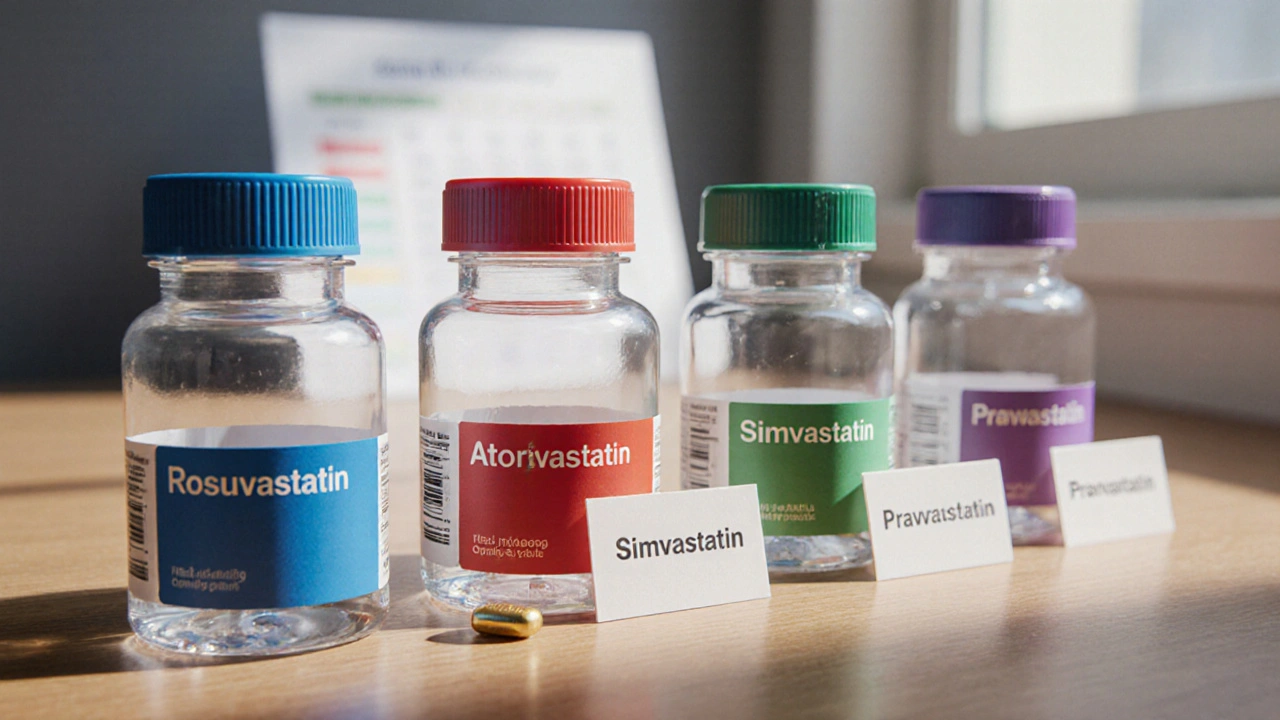A clear side‑by‑side comparison of Rosuvastatin with Atorvastatin, Simvastatin and Pravastatin, covering potency, cost, safety, and who should use each.
Everything You Need to Know About Cholesterol Medication
High cholesterol can sneak up on anyone, but the good news is there are drugs that bring those numbers down. Whether you’ve just got a prescription or you’re weighing options, this guide breaks down the basics so you can make smart choices without the jargon.
Types of Cholesterol Medication
The most common class is statins. They block an enzyme your liver needs to make cholesterol, which usually drops LDL (the “bad” cholesterol) by 20‑50%. Popular names you’ll hear are atorvastatin, rosuvastatin, and simvastatin.
If statins don’t cut it, doctors may add ezetimibe, which stops cholesterol from being absorbed in the gut. Another option is a PCSK9 inhibitor like alirocumab—these are injectable and work by boosting the liver’s ability to clear LDL.
For people with high triglycerides, fibrates (gemfibrozil, fenofibrate) or prescription niacin can help, though they’re less commonly used as the first line.
How These Drugs Work in Simple Terms
Think of your liver as a factory. Statins tell the factory to slow production, while ezetimibe tells the intake line to stop pulling in cholesterol from food. PCSK9 inhibitors are like a traffic cop, telling the liver to pull more cholesterol off the bloodstream.
The result is lower LDL, a modest rise in HDL (the “good” cholesterol), and a slower buildup of plaque in arteries. Over time, that translates to reduced risk of heart attacks and strokes.
Managing Side Effects
Most people tolerate statins well, but muscle aches, mild liver enzyme bumps, or digestive upset can happen. If you notice unexplained soreness, talk to your doctor before stopping—sometimes a dose tweak or switching to a different statin helps.
PCSK9 inhibitors can cause injection site reactions or flu‑like symptoms, which usually fade. Ezetimibe is generally easy on the stomach, but a few folks report diarrhea.
Regular blood tests every 3‑6 months let your doctor track liver function and cholesterol levels, catching any issues early.
Putting Medicine Together with Lifestyle
Medication works best alongside a heart‑healthy diet: more veggies, whole grains, lean proteins, and less saturated fat. Even a short walk most days can boost HDL and keep weight in check, which helps the meds do their job.
If you’re a smoker, quitting can double the benefit of any cholesterol drug. And limit alcohol; too much can raise triglycerides and strain the liver.
Quick FAQ
Do I need to take statins forever? Most doctors recommend long‑term use because cholesterol can rise again once you stop.
Can I skip a dose? Missing one pill isn’t usually a problem, but try to keep a consistent schedule.
Are there natural alternatives? Foods like oats, nuts, and fatty fish support cholesterol health, but they rarely replace a prescription when levels are high.
Got more questions? Talk to your pharmacist or healthcare provider—they can tailor the plan to your health story.
Learn step‑by‑step how to find reputable sites, compare prices, and safely purchase cheap generic Crestor (rosuvastatin) online while protecting your health.


